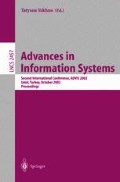Abstract
Addition and addition-subtraction chains consist of a sequence of integers that allow one to efficiently compute power T E, where T varies but E is constant. The shorter the addition (addition-subtraction) chain is, the more efficient the computation. Solving the optimisation problem that yields the shortest addition (addition-subtraction) is NP-hard. There exists some heuristics that attempt to obtain reduced addition (addition-subtraction) chains. We obtain minimal addition (addition-subtraction) chains using genetic algorithms.
Access this chapter
Tax calculation will be finalised at checkout
Purchases are for personal use only
Preview
Unable to display preview. Download preview PDF.
References
DeJong, K. and Spears, W.M., An analysis of the interacting roles of the population size and crossover type in genetic algorithms, In Parallel problem solving from nature, pp. 38–47, Springer-Verlag, 1990.
DeJong, K. and Spears, W.M., Using genetic algorithms to solve NP-complete problems, Proceedings of the Third International Conference on Genetic Algorithms, pp. 124–132, Morgan Kaufmann, 1989.
Erdös, P., Remarks on number theory III: On addition chain, Acta Arithmetica, pp 77–81, 1960.
Gordon, D.M., A survey of fast exponentiation methods, technical report
Haupt, R.L. and Haupt, S.E., Practical genetic algorithms, John Wiley and Sons, New York, 1998.
Knuth, D.E., The Art of Programming: Seminumerical Algorithms, vol. 2. Reading, MA: Addison_Wesley, Second edition, 1981.
Koç, Ç.K., High-speed RSA Implementation, Technical report, RSA Laboratories, Redwood City, califirnia, USA, November 1994.
Kunihiro, N. and Yamamoto, H., New methods for generating short addition chain, IEICE Transactions, vol. E83-A, no. 1, pp. 60–67, January 2000.
Michalewics, Z., Genetic algorithms + data structures = evolution program, Springer-Verlag, USA, third edition, 1996.
F. Miller, Use of elliptic curves in cryptography, Advances in Cryptology—Crypto’ 85, Lecture Notes in Computer Science 218, Springer-Verlag, pp. 417–426, 1986.
Author information
Authors and Affiliations
Editor information
Editors and Affiliations
Rights and permissions
Copyright information
© 2002 Springer-Verlag Berlin Heidelberg
About this paper
Cite this paper
Nedjah, N., de Macedo Mourelle, L. (2002). Minimal Addition-Subtraction Chains Using Genetic Algorithms. In: Yakhno, T. (eds) Advances in Information Systems. ADVIS 2002. Lecture Notes in Computer Science, vol 2457. Springer, Berlin, Heidelberg. https://doi.org/10.1007/3-540-36077-8_31
Download citation
DOI: https://doi.org/10.1007/3-540-36077-8_31
Published:
Publisher Name: Springer, Berlin, Heidelberg
Print ISBN: 978-3-540-00009-9
Online ISBN: 978-3-540-36077-3
eBook Packages: Springer Book Archive

